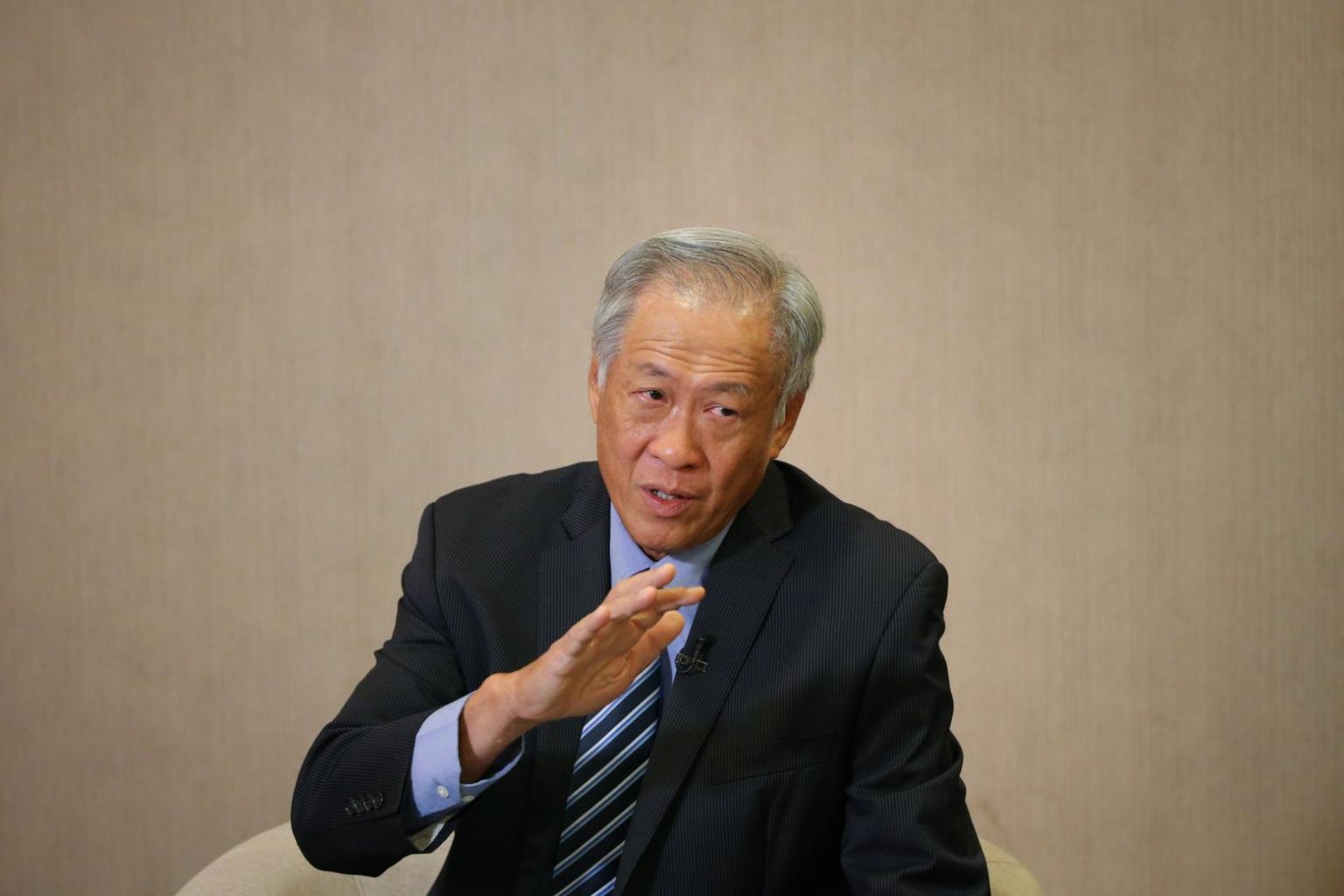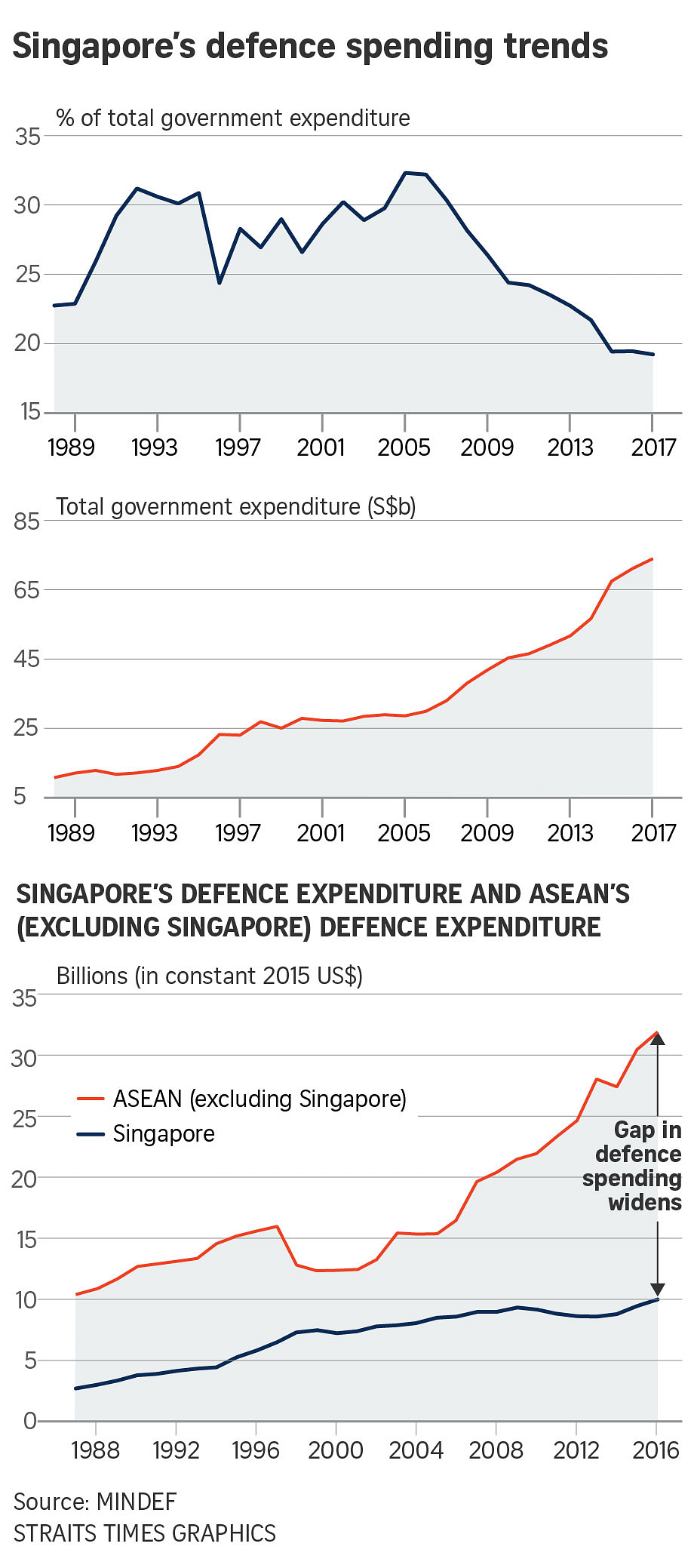Parliament: Defence spending to remain steady even as other countries spend more on wide-ranging security threats, says Ng Eng Hen
Sign up now: Get ST's newsletters delivered to your inbox

Defence Minister Ng Eng Hen said the Ministry of Defence should maintain a spending that keeps pace with inflation - of around 3 per cent to 4 per cent each year.
ST PHOTO: ONG WEE JIN
SINGAPORE - Substantial investments by past governments in building up the Singapore Armed Forces (SAF) will allow Singapore to keep its defence spending steady even as countries in the region are spending more and against wide-ranging security threats, said Defence Minister Ng Eng Hen in Parliament on Friday (March 2).
He said there is a need to prioritise and optimise resources, such as investing in new technologies to overcome Singapore's constraints. Such technologies include unmanned surveillance towers, unmanned surface vessels and drones to perform runway damage assessments.
Dr Ng said the Ministry of Defence should maintain a spending that keeps pace with inflation - of around 3 per cent to 4 per cent each year.
Defence spending rose from about $14.2 billion in Fiscal Year 2017 to a budgeted $14.76 billion for FY2018, an increase of 3.9 per cent.
"Even for the next decade, Mindef does not foresee any spike in defence spending. Obviously, this will not apply if there are exigencies or unexpected scenarios," he said during the debate on his ministry's budget.
He said that in the last decade, other Asean countries have been spending more to modernise their defence capabilities, with Singapore's defence spending keeping pace with Asean's until about 2006.
"The gap between Singapore's spending compared to the rest of Asean has increased, but Singapore need not increase its defence spending radically now to play catch-up."
This is because decades of commitment from previous generations in both financial resources and support for national service and the SAF have resulted in a strong SAF today, Dr Ng said.

"The results of that unequivocal commitment are plain for everyone to see - to Singaporeans, to our neighbours and indeed globally - an SAF today that is able to defend Singapore, but beyond that, an SAF that has contributed to global security."
This comes despite how defence spending as a percentage of government expenditure has dropped "substantially" in the last decade to around 19 per cent in 2017, from a high of nearly a third of all government spending in the mid-2000s.
Dr Ng pointed to two lessons learnt from Singapore's experience, as well as that of "negative examples" from other countries.
He said: "First, the best time to prepare for trouble is during peace. Second, in the long run, steady investments into military capabilities maintain peace through deterrence and result in more effective outcomes. It is actually the most efficient yield for defence investments."
He said that for instance, Denmark announced in October last year that it would now increase defence spending by 20 per cent over the next five years.
In Germany, due to 25 years of cuts to the defence budget, its military is underfunded and fewer than half of its submarines and planes are operationally ready, according to its government's own assessment, Dr Ng said.
"These are salutary lessons that we must voraciously imbibe because someone else has paid to learn them," he said.
On the terror threat, Dr Ng said the SAF's Homeland Security Training Centre and the Singapore Police Force's Frontline Policing Training Centre will conduct routine joint training and equip servicemen with the skills to perform homeland security operations.
On the international front, he announced that more troops will be deployed to Iraq later this year to help train Iraqi Security Forces to counter improvised explosive devices, and in tactical weapons and combat tactics.
In terms of cyber attacks, he said, senior Mindef and SAF leaders have been deliberately targeted by "spear-phishing" attempts - innocent looking e-mails containing malicious software - conducted by freelancers, as well as organised state and non-state actors.
"They have not succeeded but they will keep trying," he said.
Dr Ng agreed with the view of Dr Teo Ho Pin (Bukit Panjang) on the need to harness new technologies to overcome Singapore's constraints.
He cited the army's Unmanned Watch Tower that can operate round the clock in all-weather conditions and reduce the number of soldiers needed by up to a third. The first tower is operational this month on Jurong Island, with two more to be deployed by September.

The air force also aims to use drones to perform runway damage assessment and respond to intruding drones, with trials currently ongoing, while unmanned vessels will soon be used for patrols and underwater surveys.


